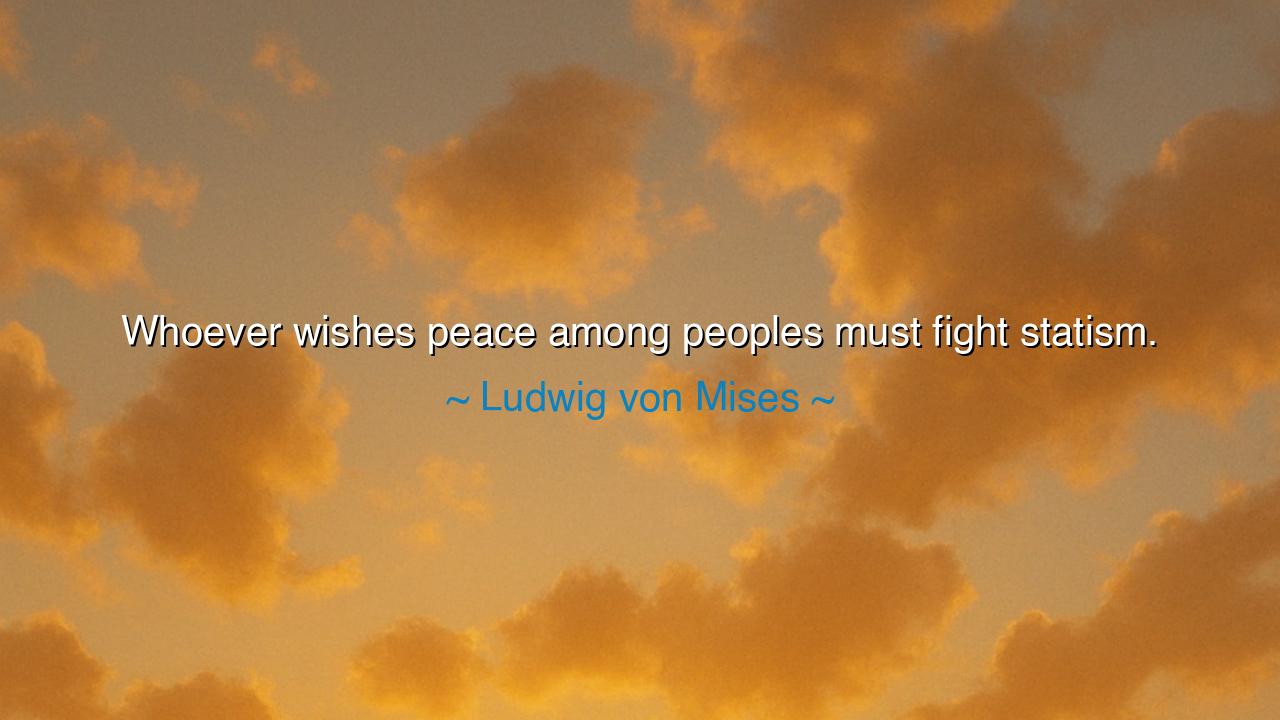
Whoever wishes peace among peoples must fight statism.






Ludwig von Mises, the great defender of liberty, proclaimed with the voice of both warning and wisdom: “Whoever wishes peace among peoples must fight statism.” These words, born out of the turbulence of the twentieth century, carry with them the weight of lived history. For Mises saw with his own eyes the rise of regimes that placed the state above the individual, that sacrificed human dignity for the ambitions of rulers, and that cloaked oppression in the language of order. His quote is not merely political counsel—it is a moral cry, urging all who love peace to beware the idol of statism, for it is an idol that devours nations and makes war its sacrifice.
To understand the origin of this saying, one must know Mises’ world. He lived in Europe when the fires of fascism and socialism raged, when Hitler and Stalin raised their banners, and when millions perished beneath the machinery of totalitarianism. For him, statism—the belief that the state is supreme, that individual freedoms must be crushed beneath collective control—was not an abstract concept but a lived horror. He saw that war did not spring from freedom, but from the lust of states that sought to dominate. Thus he declared: if peace is our desire, then it is the unchecked power of the state that we must resist.
His words echo a truth that is as old as the chronicles of kings. When rulers exalt their own power above the rights of their people, war becomes inevitable. From Pharaohs who enslaved nations, to Caesars who sought dominion over the known world, to modern dictators who silenced dissent and marched their people into endless conflict—the pattern is the same. The state that grows too mighty consumes not only the liberty of its people, but the peace of the earth. Statism breeds conflict; liberty nourishes peace.
History gives us clear testimony. Consider the Cold War, when the United States and the Soviet Union stood as symbols of freedom and statism. One cherished the liberty of the individual, while the other exalted the centralized power of the state. It was the Soviet Union’s relentless hunger for control—over its people, over its neighbors, over the world—that fueled decades of tension, proxy wars, and the threat of annihilation. Peace came not when statism triumphed, but when it collapsed under its own weight, allowing nations to breathe again.
Yet the lesson is not only for nations—it is for every soul. For statism begins in the heart, when men and women trade freedom for the illusion of safety, when they surrender their responsibilities to distant powers in exchange for comfort. Mises warns us: do not yield the sacred ground of liberty, for once it is surrendered, peace will vanish as well. Peace is not maintained by chains, but by choice.
The teaching is clear: if we wish to secure peace among peoples, we must guard the dignity and freedom of the individual. In practical terms, this means holding rulers accountable, resisting the temptation of overreaching government, and cherishing the rights that allow communities to flourish without coercion. It means remembering that true harmony comes not from force imposed from above, but from cooperation born of free will.
So let these words of Mises be a torch for every generation: “Whoever wishes peace among peoples must fight statism.” Let us remember that the enemy of peace is not liberty, but tyranny disguised as order. Let us resist the rise of power that seeks to silence the individual, and let us build a world where peace is secured by the free choices of free people. For only in liberty can tranquillity endure, and only in freedom can the peoples of the earth dwell together without fear.






AAdministratorAdministrator
Welcome, honored guests. Please leave a comment, we will respond soon